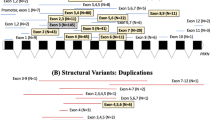Summary.
Immunomodulating factors have been shown to play a role in the pathogenesis of Parkinson's disease (PD) by biochemical methods. In order to investigate functionally important genes of the tumor necrosis factor alpha (TNFα) pathway we studied the frequency of DNA polymorphisms in the interleukin 6 (IL6), the TNFα, and the TNFα receptor 1 (TNFR1) genes in 264 sporadic German PD patients and in 183 age and sex matched German healthy controls. Analyzing the TNFα-308 polymorphism we found heterozygous individuals carrying alleles 1 and 2 more frequently in patients with a relative risk of 1.56 (p = 0.046, pc = 0.13, χ2 = 3.98). In contrast, the frequency of the B/2 haplotype described by the TNFR1−609 and TNFRI+36 polymorphisms was significantly decreased in our PD patients group (p = 0.0097, pc = 0.048, χ2 = 6.69) with a relative risk reduced to 0.52. Our results suggest an involvement of immunomodulating factors in the pathogenesis of sporadic PD as revealed by a molecular genetic approach.
Similar content being viewed by others
Author information
Authors and Affiliations
Additional information
Received October 7, 1999; accepted January 11, 2000
Rights and permissions
About this article
Cite this article
Krüger, R., Hardt, C., Tschentscher, F. et al. Genetic analysis of immunomodulating factors in sporadic Parkinson's disease. J Neural Transm 107, 553–562 (2000). https://doi.org/10.1007/s007020070078
Issue Date:
DOI: https://doi.org/10.1007/s007020070078




